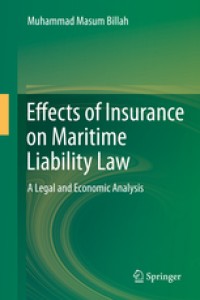Book
Effects of Insurance on Maritime Liability Law: A Legal and Economic Analysis
The book examines how the absence of insurance in the past led to some unique maritime liability law principles such as ‘general average’ (i.e., losses or expenses shared by all the parties to a maritime adventure) and the limitation of ship owners’ liability. In the absence of insurance, these principles served the function of insurance mostly for ship owners. As commercial marine insurance is now widely available, these principles have lost their justification and may in fact interfere with the most important goal of liability law, i.e., deterrence from negligence. The book thus recommends their abolition. When insurance is easily available and affordable to both parties to a liability claim, the main goal of liability law should be deterrence as opposed to compensation. This is the case with maritime cargo liability claims where both cargo owners and ship owners are invariably insured. As a result, the main focus of the cargo liability law should be and, to a great extent, is deterrence. On the other hand, in the vessel-source oil pollution liability setting, pollution victims are not usually insured. Therefore, oil pollution liability law has to cater for both compensation and deterrence, the two traditional goals of liability law. The final issue addressed in the book is whether the deterrent effect of liability law is compromised by the availability of liability insurance. Contrary to popular belief, the book argues that the presence of liability insurance is not necessarily a hindrance but can be a complementary force towards the realization of deterrent
goal of liability law. As the book is the modified version of my doctoral thesis, I am very grateful to my supervisor, Professor Andre´ Brae¨n of University of Ottawa, Canada, and to the members of thesis defense committee, Professor Martin Davies of Tulane Law School, Professor Donald McRae, Professor Denis Boivin and Professor Jamie Benidickson of University of Ottawa, for their valuable comments and suggestions.
Ketersediaan
Informasi Detail
- Judul Seri
-
-
- No. Panggil
-
TXT MR BIL e
- Penerbit
- New York : Springer., 2014
- Deskripsi Fisik
-
xv, 207 p
- Bahasa
-
English
- ISBN/ISSN
-
978-3-319-03488-1
- Klasifikasi
-
MR
- Tipe Isi
-
-
- Tipe Media
-
-
- Tipe Pembawa
-
-
- Edisi
-
-
- Subjek
- Info Detail Spesifik
-
-
- Pernyataan Tanggungjawab
-
Billah, Muhammad Masum
Versi lain/terkait
| Judul | Edisi | Bahasa |
|---|---|---|
| Ericsson's proactive supply chain risk management approach after a serious sub-supplier accident | Vol. 34 No. 5, 2004 pp. 434-456 | en |
| A Supply Chain management guide to business continuity | en | |
| Smart Logistics and Global Supply Chain Management | en | |
| Collaborative risk management in sensitive logistics nodes | Vol. 19 No. 7/8, 2013 pp. 331-351 | en |
| Economic analysis - commodity exporters face multi-year challenge | en |
Lampiran Berkas
Komentar
Anda harus masuk sebelum memberikan komentar

 Karya Umum
Karya Umum  Filsafat
Filsafat  Agama
Agama  Ilmu-ilmu Sosial
Ilmu-ilmu Sosial  Bahasa
Bahasa  Ilmu-ilmu Murni
Ilmu-ilmu Murni  Ilmu-ilmu Terapan
Ilmu-ilmu Terapan  Kesenian, Hiburan, dan Olahraga
Kesenian, Hiburan, dan Olahraga  Kesusastraan
Kesusastraan  Geografi dan Sejarah
Geografi dan Sejarah